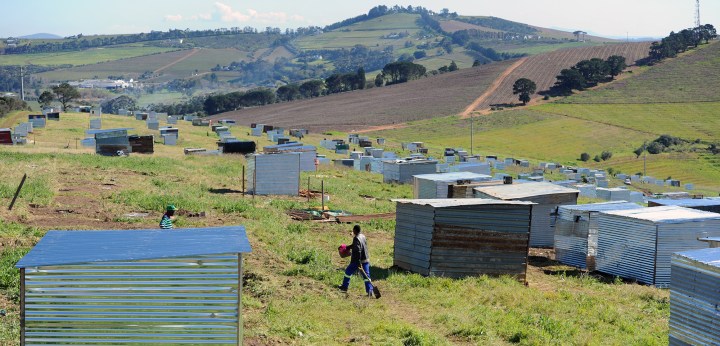BUSINESS MAVERICK OP-ED
Expropriation Bill must include guarantees to safeguard the market value of property

The government should automatically guarantee the difference between ‘just and equitable’ compensation and market value. Where mortgaged land is acquired at less than market value, the state should pay the financial institution the difference between expropriation compensation and the outstanding amount, up to the property’s market value.
Expropriation of property at below market value or with nil compensation looms large for all property owners, investors and savers in South Africa. The values of farms, homes and business premises, as well as financial products that are based on these assets – such as bonds and derivatives – are at risk from this.
The market value of land-based property in South Africa is estimated at R7.5-trillion, much of which is made up of the homes and savings of ordinary people. Banks, which hold in trust the savings of South African workers, professionals and businesses, have extended about R1.6-trillion in mortgages to borrowers.
Banks are mindful of the need to protect the interests of their customers, who are depositors and borrowers. The Banking Association South Africa (Basa) has made a detailed submission on the Expropriation Bill, which will give effect to the proposed amendment to section 25 of the Constitution that aims to explicitly provide for expropriation without compensation.
Basa highlights that:
- A sound banking and financial system is essential for inclusive economic growth. Banks rely on the market value of property as security for loans, to protect investors and to ensure that customer deposits can be paid on demand and with interest. Banking crises often start with a decline in the value of land-based property and the impact this has on market confidence; and
- “Just and equitable” compensation for expropriated land may be below market value or even nil. The Banks Act imposes an obligation on banks to value property at market value to meet their capital, solvency and liquidity requirements. Should property be expropriated at below market value, this will inhibit a bank’s ability to provide credit where property serves as security for a loan. Expropriation at below market value or at nil compensation can also reduce the capacity of banks to extend credit, which is often used by entrepreneurs and for personal development. Without appropriate security, banks will have to adopt more conservative loan policies. Entrepreneurs and small business owners will consequently find it more difficult to access capital to establish and grow their businesses, with adverse consequences for South Africa’s unemployment levels and economic growth prospects.
To mitigate against this, the government should automatically guarantee the difference between “just and equitable” compensation and market value. This approach was approved by Cabinet in October 2012 when it adopted the Department of Rural Development and Land Reform policy: “A framework for land acquisition and land valuation in a land reform context and for the establishment of the Office of the Valuer-General.”
This policy recommended that where mortgaged land has been acquired at less than market value, the government should pay the financial institution concerned the difference between expropriation compensation and the outstanding amount, up to the market value of the property.
This guarantee will allow financial institutions to continue lending based on market value. This will also assist borrowers, as legal opinion indicates that owners whose property is expropriated, would still be liable for their debt on the underlying asset.
The possibility of expropriation without compensation will discourage essential investment by farmers into their property. The likely outcomes of expropriating agricultural land for less than market value is severe, including increased food insecurity.
In its current form, the Expropriation Bill may discourage international and local investment into South Africa and result in capital flight should investors incur losses due to expropriation at below market value. To provide greater clarity and certainty to investors, the definition of property that can be expropriated should be restricted to tangible property. Intellectual property must be protected.
Basa welcomes the right of property owners to access the courts should they feel that expropriation has been less than “just and equitable”. However, our already overburdened courts should not be the only form of recourse available to aggrieved property owners. The legislation itself should include safeguards to ensure “just and equitable” compensation.
Basa fully supports the government’s initiatives to rectify past racial injustices, to correct current land ownership patterns and to alleviate poverty. We are committed to playing a leading role, working with key stakeholders, in finding all-inclusive solutions to this and other economic challenges to create a better life for all South Africans.
However, expropriation of land at below market value will have consequences if not managed in an orderly manner. There is a need for crisp and clear legislation that removes any policy uncertainty, and that ensures that the more than 230 state entities which are empowered to expropriate property do so in a prudent and balanced manner, and which is aligned to section 25 of the Constitution.
Should the legislation fail to adequately protect the financial system and the rights of property owners, the likely result will be greater levels of unemployment, inequality and poverty in our country, deepening the very injustices and social ills that the legislation is seeking to redress. DM
Bongiwe Kunene is Managing Director of the Banking Association South Africa.


















 Become an Insider
Become an Insider
Wrong! There should be NO Expropiation without Compensation. The present legislation is ok.
OMG – if this is BASA’s position, I have to say I’m very glad to have dumped my banking shares last year. “… expropriation of land at below market value will have consequences if not managed in an orderly manner …” Seriously? You’re going to manage this? How, exactly? Laughable politico-speak.
What the politicians have not worked out is that one day it could be their land being expropriated on the basis that they might be from the wrong tribe or vote for the wrong party. Ideologues have no understanding of the real world and the implications of their political games.
If property/land can be expropriated with no compensation, where is the so-called “market value”? If the government can expropriate any land it wishes to, what’s to stop it from attaching ALL land and then demanding rental from the erstwhile owners?